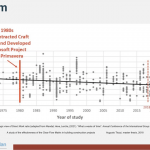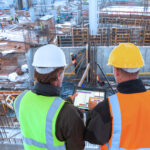We sat down with the MOCA Systems President Sandy Hamby and asked her some questions about her experience as not only a woman in the construction space, but a leader.
How has the industry changed for the better, and where do you see areas for improvement?
When I first started back in the 1980s, there weren’t very many women in the business, but at the same time, I personally didn’t perceive a lot of limitations. Originally, there was a good ole boy’s club. Today, it can still be intimidating and challenging, but the industry is more open than in 1985. Women still face limitations, especially if you don’t have an assertive type personality. In general, I think inclusivity in the construction industry is being addressed more candidly today, and we’ve got a ways to go.
What advice would you offer to young women looking to build a career in construction? What resources need to be made more readily available?
The one piece of advice I’ve consistently given is: “Always ask questions”. The industry is complex. There’s no one professional that knows everything relative to construction. So, don’t think you have to know it all, and when you come into an environment in which you may not have automatic respect; don’t pretend that you know everything; ask questions. If you see something relative to electrical power or chiller plants, find the right person and utilize their expertise for what you want to know. What I found in the industry is people like to help people. They like to answer your questions, and it allows you to learn. So that’s my biggest advice. Nobody, not even the people to whom you’re asking questions know everything; it’s just too complex.<
So, in terms of asking questions. Do you feel that the average woman feels that males will be “well, you should know that already”? Do you get that impression, or are people open to anyone inquisitive?
I’ve found people incredibly open to inquisitive minds. I think that sometimes people think they have to know more than they do. When this particular behavior appears, the response in the field can be an immediate shutdown. This approach does not allow progressive learning, and does not build trust in the field. On occasion, there are individuals who may respond with: “you don’t know what you’re doing,” or what a stupid question!”? Unfortunately, those people do exist, but 90% of people aren’t like that. You have to be confident in yourself and know there are no dumb questions. And if someone treats you like that, don’t waste your time with them….move on.
Do you feel that women are being recognized for their achievements in the construction industry?
Most women just want to be recognized because they are good, not because they are a woman. And yet, to inspire young women to get into Science, Technology, Engineering and Mathematics (STEM) and Architecture, Construction and Engineering (ACE) programs, it’s good to set aside accolades just for women. It is important to promote women through awards because this helps encourage others to choose this career field. Many of my colleagues, including myself, were mentored by men in the industry. The men have promoted us and submitted our names as exemplary professionals in this industry. As a result, we received awards, got on boards, and were appointed to committees. I was fortunate enough to be adopted and to be a part of and early group of women in construction to break a few ceilings.
What opportunities for growth do you see for women in the industry?
I see a lot of growth opportunities. I like to pivot a little bit here because my perspectives are a little bit different. I was raised in the fighter pilot, “The Right Stuff” kind of environment. I bring that up because not only does this group of people have a very high tolerance for risk but the women were individuals who thrived in that environment as well. So, why does that matter? Growing up, I was never told I could not be President of the United States of America; it never entered my mind that I couldn’t be an astronaut. It never entered my mind that there were limitations because I was a woman. In the culture that I was raised in, I was treated fairly and equitably. I could walk up to fighter pilots, and they would teach me about an airplane. The women in my world were intelligent. So being a woman in the construction industry did not seem like a big deal. It wasn’t until I grew into the industry that I realized that my worldview was very different from the majority of my counterparts. It never entered my mind that I couldn’t be a leader in the industry for a company or an organization like CMAA. I saw individuals like Christine Keville, from Keville Enterprises, and Rebecca Jones from Safework CM become the chair of CMAA and I said to myself, of course she’s the Chair.
Slowly and surely, more and more women have started from the construction trailer or as detail architects and became leaders in their own design and construction companies. Women have created an excellent path forward within the industry.
So, it sounds like the advice you might give those who want to get into the industry is “don’t ever think there isn’t a path”?
That’s right. Don’t ever let that that type of thinking enter your perspective on things. There is an absolute path to success. Are you going to find people that want to hold you back? Yes, you will. Are you going to run into problems? Yes, you will. But the bottom line is it’s not because you don’t belong there. Don’t ever let anybody stop you because you absolutely belong!
What is the most important thing you have learned over the last year?
I’ve learned two big lessons:
1) Relationships are the key to success, no matter what you’re doing. Build trusting and long-term relationships with the people you work with, your family, your professional associations are all extremely important. You grow because you care about people. If you keep that fact front of mind, the rest takes care of itself. Revenue, goals, KPIs, and all of the elements that track progress are important, but if you don’t take care of your relationships, nothing else matters. Recently, building and maintaining relationships in a remote environment has been very difficult. Taking the time to reach out consistently and staying close to other people helps maintain balance.
2) A labor shortage in our field offers opportunities. What’s important are things like the ACE and STEM programs. I am involved in both, and MOCA Systems, Inc. regularly sponsors scholarships for young women and professionals in construction, engineering, and design. We financially and professionally support young people to get them where they want to go.
Was construction your first choice and howwhy did you make the migration, and what are some of the key differences?
I was a design architect first. I would spend hours on the computer designing, and I began to think, this isn’t what I thought being an architect would be like. On my first design project I made multiple mistakes. I was lucky enough to have a contractor on this job that was interested in teaching me about my mistakes. I went out to the construction site and met with the contractor regularly and realized, wow, this is kind of fun. I like this side of the industry. The contractor showed me how everything was being constructed and what I did wrong on the drawings versus how it was actually built, and I absorbed those lessons. The key critical moment was when I was on a project for the San Antonio Convention Center. They brought in Big Bertha, which is the largest crane in Texas. We had a tower crane sitting in the middle of the convention center, and it needed to be disassembled as we were completing construction. I thought to myself, “I’m going to watch this.” They put out the outriggers and started setting the crane up for the lift. Of course, the crane itself weighs a lot. Well, it started to sink. I watched the construction professionals problem-solve in the middle of downtown San Antonio as this crane is starting to cause a collapse in the street structure. The next thing I know, a helicopter comes in with large steel sheets, one after another, and this construction team starts to distribute the crane’s load as quickly as possible. They were afraid to move the crane because they didn’t know why it was collapsing in the first place. Well, the quick problem-solving accomplished in the middle of a crisis was impressive and a fabulous example of what it meant to be a construction professional. After that moment, I thought, these guys are smart, they’re creative, they know how to resolve things, and this is what I want to do for my career!
What are the top three things you would want others to know about your experience or what it is like to be a woman in Construction?
That it’s really fun and a fabulous industry to go into. Always trust your gut. Finally, no matter how many years you have in the business, you never know everything there is to know. There’s always something to learn.










